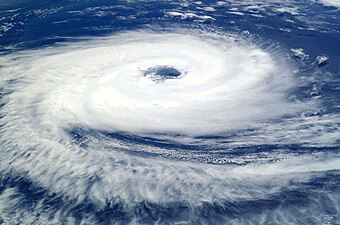| Main page | New articles & Tasks |
 The Energy Portal Welcome to Wikipedia's Energy portal, your gateway to energy. This portal is aimed at giving you access to all energy related topics in all of its forms.
|
Page contents: Selected article • Selected image • Selected biography • Did you know? • General images • Quotations • Related portals • Wikiprojects • Major topics • Categories • Help • Associated Wikimedia |
Introduction
Energy (from Ancient Greek ἐνέργεια (enérgeia) 'activity') is the quantitative property that is transferred to a body or to a physical system, recognizable in the performance of work and in the form of heat and light. Energy is a conserved quantity—the law of conservation of energy states that energy can be converted in form, but not created or destroyed; matter and energy may also be converted to one another. The unit of measurement for energy in the International System of Units (SI) is the joule (J).
Common forms of energy include the kinetic energy of a moving object, the potential energy stored by an object (for instance due to its position in a field), the elastic energy stored in a solid object, chemical energy associated with chemical reactions, the radiant energy carried by electromagnetic radiation, and the internal energy contained within a thermodynamic system. All living organisms constantly take in and release energy.
Due to mass–energy equivalence, any object that has mass when stationary (called rest mass) also has an equivalent amount of energy whose form is called rest energy, and any additional energy (of any form) acquired by the object above that rest energy will increase the object's total mass just as it increases its total energy.
Human civilization requires energy to function, which it gets from energy resources such as fossil fuels, nuclear fuel, or renewable energy. The Earth's climate and ecosystems processes are driven by the energy the planet receives from the Sun (although a small amount is also contributed by geothermal energy). (Full article...)
Selected article
Natural gas, often referred to as simply 'gas', is a gaseous fossil fuel consisting primarily of methane. Natural gas is found in oil fields, natural gas fields, and in coal beds (as coalbed methane). Before use as a fuel, natural gas undergoes extensive processing to remove almost all materials other than methane.
Natural gas is a major source of electricity generation, and particularly high efficiencies can be achieved through combining gas turbines with a steam turbine in combined cycle mode. Natural gas burns cleaner than other fossil fuels, producing about 30% less carbon dioxide than oil and about 45% less than coal, per unit of energy released. It is also expected that natural gas reserves will peak around 2030, some 20 years after peak oil production. Compressed natural gas is also used as a cleaner alternative to other automobile fuels such as gasoline (petrol) and diesel. Natural gas is also used domestically for cooking and for central heating.
The major difficulty in the use of natural gas is transportation and storage because of its low density. Pipeline transport is economical, but is impractical across oceans. Liquefied natural gas can be shipped in LNG carriers, however the required liquefaction facilities add to the cost. The practice of flaring gas released in the course of recovering petroleum, so adding to greenhouse gas emissions, is now illegal in many countries.
Selected image

Photo credit: Johnson Space Center/NASA
Tropical cyclones feed on the heat released when moist air rises and the water vapor condenses.
Did you know?

- The Power of Community: How Cuba Survived Peak Oil is a documentary film which details Cuba's efforts to recover from the 1990s economic crisis known as the Special Period?
- The Geysers (pictured), north of San Francisco, California, is the largest geothermal power development in the world?
- The International Energy Agency was founded in 1974 by the Organisation for Economic Co-operation and Development (OECD) in the wake of the 1973 oil crisis?
- Indian Railways has started to use Jatropha oil, blended with diesel fuel in various ratios, to power its Diesel locomotives?
- The South Wales Gas Pipeline is the largest high pressure gas pipeline in the United Kingdom?
- The Presbyterian Church (USA) was the first major religious denomination in the world to call on its followers to become carbon neutral?
- There was partial meltdown at the Three Mile Island nuclear power plant in 1979?
- A hybrid electric vehicle achieves better fuel economy than a conventional vehicle without being hampered by the limited range of an electric vehicle?
Selected biography
Hansen studied at the University of Iowa, obtaining a B.A. in Physics and Mathematics, an M.S. in Astronomy and a Ph.D. in Physics. He was elected to the National Academy of Sciences in 1996 and received the Heinz Environment Award for his research on global warming in 2001.
Hansen is a vocal critic of the Bush Administration's ideology on climate change. In 2005 and 2006, he claimed that NASA administrators have tried to influence his public statements about the causes of climate change. He has also claimed that the White House edited climate-related press releases from federal agencies to make global warming seem less threatening, and that he is unable to speak 'freely', without the backlash of other government officials.
Hansen has said that a global tipping point will be reached by 2016 if levels of greenhouse gases are not reduced. After this point global warming becomes unstoppable. As a result he claims that there may be a rise in sea levels by as much as 10 feet (3 metres) by 2100.
In the news
- 10 July 2024 – Russian invasion of Ukraine
- Two Ukrainians are killed by Russian drone and missile attacks on a port in southern Odesa Oblast, Ukraine, which damaged port infrastructure, an energy facility, and a civilian ship. (Reuters)
General images
Quotations
- "We simply must balance our demand for energy with our rapidly shrinking resources. By acting now we can control our future instead of letting the future control us." – Jimmy Carter, 1977
- "It is sensible to improve energy efficiency and to develop alternative and sustainable sources of supply; it's sensible to replant the forests which we consume; it's sensible to re-examine industrial processes; it's sensible to tackle the problem of waste. I understand that the latest vogue is to call them 'no regrets' policies. Certainly we should have none in putting them into effect." – Margaret Thatcher, 1990
- "We have the opportunity and potential to create an oil-free future today, it is potentially right around the corner - and, more often than not, the technology is already here." – John Kerry, 2003
Related portals
WikiProjects
WikiProjects connected with energy:
Other WikiProjects that may be of interest:
Major topics
Major categories
National energy supply, use & conservation
National electricity sector
Politics, economics, environment
- Climate change
- Energy conservation
- Energy economics
- Energy crises
- Energy development
- Energy policy
- Peak oil
Energy sources
- Fuels
- Biofuels
- Fossil fuels
- Fusion power
- Nuclear technology
- Renewable energy
- Energy conversion
- Electric power
- Energy storage
Energy-related design
Scientific usage
Help

Puzzled by energy?
Can't answer your question?
Don't understand the answer?
- Ask at the reference desk
- Read the Wikipedia help pages
For further ideas, to leave a comment, or to learn how you can help improve and update this portal, see the talk page.
Associated Wikimedia
The following Wikimedia Foundation sister projects provide more on this subject:
-
Commons
Free media repository -
Wikibooks
Free textbooks and manuals -
Wikidata
Free knowledge base -
Wikinews
Free-content news -
Wikiquote
Collection of quotations -
Wikisource
Free-content library -
Wikiversity
Free learning tools -
Wiktionary
Dictionary and thesaurus


























































































































































































